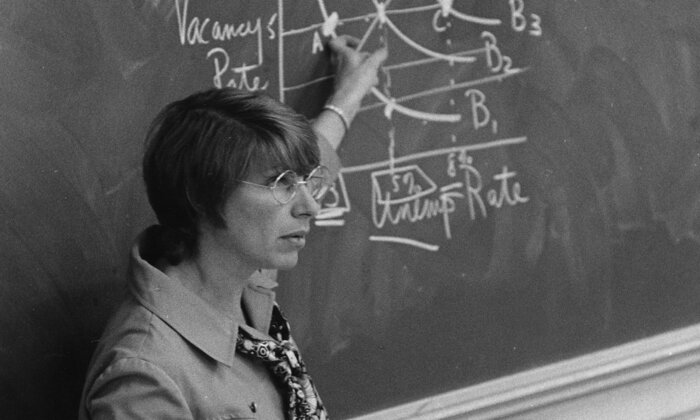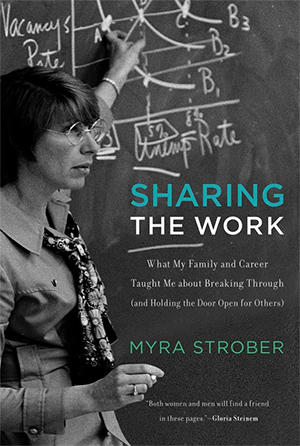Podcast: An Economist's Fight for Equity in the Workplace

Myra Strober became a feminist on the Bay Bridge, heading toward San Francisco. It is 1970. She has just been told by the chairman of Berkeley’s economics department that she can never get tenure. Driving home afterward, wondering if she got something out of the freezer for her family’s dinner, she realizes the truth: She is being denied a regular faculty position because she is a mother. Flooded with anger, she also finds her life’s work: to study and fight sexism, in the workplace, in academia, and at home.

In this episode of the MIT Press podcast, podcaster Chris Gondek talks to Myra Strober, a labor economist and the author of “Sharing the Work,” about that life-changing meeting at Berkeley, how her childhood affected her views on women in the workplace, and the stubborn challenges — and industries — that continue to hold women back.
A stream and transcript of the podcast, which was originally recorded in 2016, can be found below.
Chris Gondek: Hello and welcome to the MIT Press Podcast. I’m your host, Chris Gondek, and today I’m speaking with Myra Strober about her new book, “Sharing the Work: What my Family and Career Taught me About Breaking Through and Holding the Door Open for Others.” Myra Strober is a labor economist. She’s a Professor Emerita at the Graduate School of Education at Stanford University and Professor of Economics at Stanford’s Graduate School of Business by courtesy. She is the co-author of “The Road Winds Uphill All the Way: Gender Work and Family in the United States and Japan,” which was also published by MIT Press. Myra Strober, thanks for taking the time to talk to the MIT Press Podcast today.
Myra Strober: You’re welcome.
Chris Gondek: Now, your book begins with a meeting with a colleague in the Economics department at Berkeley in 1970, a meeting that started you on the road to feminism as you went home to Palo Alto that evening. What happened in that meeting? And when you say that you became a feminist at that meeting, what changed? What were you pre-meeting and what changed for you post-meeting?
Myra Strober: Well, I called for the meeting with the chair of the Economics department at Berkeley because I had just started there as a lecturer, and one of the first days on the job, I met two of my former classmates from MIT. We had all received our Ph.D.s, and I noticed that they were both assistant professors and I was a lecturer. So I made an appointment to see the chair to find out why that was the case, and I asked him, very straightforwardly, why I was a lecturer, and he answered that it was because I lived in Palo Alto. And I was shocked because I’d never heard that one had to live in Berkeley in order to be a tenured track member of their faculty.
So I kind of slunk out of his office and got into my car to drive back to Palo Alto, and somewhere on the Bay Bridge, it occurred to me that I had been had, that one certainly did not have to live in Berkeley to be on their tenured track faculty and that the fact was that there was only one woman in the Economics department, and she had been there for 20 years or more, and she was still a lecturer. So I realized that it was because I was a woman, not because I lived in Palo Alto, that I was a lecturer.
And that insight made me a feminist. I wasn’t actually quite sure what a feminist was. So the next day, I went to the library and began reading about feminism and decided I indeed was a feminist, so that was the beginning of my fights for myself and for other women to get equity in higher education.
Chris Gondek: Elizabeth Cady Stanton is an American feminist who shows up particularly in that part when you started reading. What did you get from Stanton that made you want to go forward?
Myra Strober: Well, I loved the fact that Elizabeth Cady Stanton used the word ‘monopoly’ to describe, or rather the verb ‘monopolize’ to describe what men had done to take for themselves the most lucrative occupations, and she mentioned medicine and law, but I quickly moved from medicine and law to being a professor, and she also said that the remedy for all of this was to fight. And I agreed that I needed to fight, and women needed to fight, in order to gain the kind of equity that we needed.
Chris Gondek: I want to stay at Berkeley for just a little bit longer because there was a person on the Economics department, Lloyd Ullman, who, if I got a sense for the book, was a very important figure in your professional development, and you taught really the first Woman in Work seminar at Berkeley in the early ’70s. Could you give us a sense of how different the questions of feminism were? Or maybe they weren’t any different, and the questions that one might see in a Woman in Work seminar today.
Myra Strober: Some of the questions were similar. Lloyd Ullman really was a very important person in my life. He was a senior labor economist, and after I read Elizabeth Cady Stanton and others, and “The Feminist Mystique” by Betty Friedan and began to look at the data on women in work, I realized I wanted to teach a class on women in work, and that I needed Lloyd Ullman’s [inaudible] to do that. So I ran into him one day and asked him with great nervousness whether I could do that, and he was really a lovely man with a wonderful smile, and I could tell as soon as I’d asked him that he had thought of a joke, and he said, you realize that if I taught a course in woman in work, he would have to teach my basic labor economics class, and that he would do it as long as I would give him the Susan B. Anthony medal. So we both laughed, and years later when he retired, I actually did give him a Susan B. Anthony medal.
But the class went extremely well in some ways because the students really were so hungry for a class on women in work, but in other ways, I was quite shocked because the students were far more radical than I was. I was interested in things like childcare and occupational segregation and earnings differences, and they were interested in things like abortion and more radical issues that I didn’t think went with women in work. I gave them a reader and they wanted to discuss an article on women who were interested in violence against men, and I realized that if I was going to talk about women in work, I was going to have to learn all of these more radical feminisms, and understand, and make students understand why I was not a radical feminist.
Chris Gondek: Now, this book, although it certainly goes into your professional development as a labor economist, both at Berkeley and Stanford, it’s also a personal memoir. You spend time talking about your childhood, growing up in New York. And I wonder if you’d talk a little bit about how your parents affected your views on women in the workplace.
Myra Strober: Yes. Well, my mom was a feminist even though she didn’t call herself a feminist. She was a working woman, the school secretary, at a time when there were not very many married women in the middle class who were working if they had children. But my mom was bored staying at home, and she was lucky that her aunt was willing and able to take care of my sister and me, so my mom went to work, and my dad was very supportive of her. He realized that she was far happier working, and he was willing to take a lot of ribbing from his friends and neighbors who would say that they noticed that he was sending the little lady to work, and my dad always said to my mom that he laughed at that because they didn’t realize that he wasn’t sending my mom anywhere. So I heard all of this as a child, and my mom was very pointed in her views about marriage, and she always said, “Marriage is not the be-all and the end-all. You have to be able to support yourself in case of a rainy day.” So I got that message loud and clear.
Chris Gondek: It’s also fascinating that they produced a family with two daughters, both of whom ended up becoming economists.
Myra Strober: Yes. They had … My sister and I and my parents had wonderful dinnertime conversations all throughout our childhood and the years we were in high school. We talked about politics, we talked about economics, we talked a lot about labor unions, and my parents were very pro-labor union, although neither of them was in a union. My dad was a salesman in the clothing industry. Years later, my mom did join the union when the AFT organized in New York. But my sister and I both came to love history and economics from talking to my parents.
Chris Gondek: So I had mentioned earlier that your professional career took you to Berkeley, but the bulk of it was at Stanford. You moved from Berkeley to Stanford in the early ’70s and you started off at the Graduate School of Business. How would you describe the culture at Stanford at that time regarding female faculty members?
Myra Strober: Well, Francine Gordon and I were the first two female faculty members, and many of the men who were a lot older than we were clearly unhappy with our being there at all. Particularly since it meant that they could no longer hold their faculty retreats at one of the men’s clubs in a nearby suburb here. And they said the most outrageous things to us, like, maybe they could put bags over our heads and sneak us into this male faculty retreat so that nobody would notice that there were women there, and it was very unpleasant. It was also very unpleasant when some of the men students made it very clear in a blunt way that they were not going to be taking a class with me.
They stood up, some of them, and as they were walking out said that they were simply not paying the kind of tuition that was required in order to take Macroeconomics with the likes of me. So that was all very difficult. But our greatest support, both Francine and I, came from the dean of the business school, RJ Miller, who had come from the Ford Motor Company and gave us absolutely the most support one could ever hope for. We used to go to him and tell him some of these stories about what was happening, and he would just say, “Ignore them. They’re all babies. The students are babies, the faculty are babies. Just do your thing and move on.” And that was so helpful to both of us.
Chris Gondek: I would think perhaps you might have run into this at, say, a Harvard or a Yale in the early ’70s, which had just recently gone co-educational, but Stanford started out as a co-educational institution, and women had been there really since the beginning, so I’m just a little … I was a little surprised to read how dismissive they were of you considering that it’s not like women hadn’t been on the Stanford campus before.
Myra Strober: Yes, but the business school was a graduate institution only, it had no undergraduates, and really, there had been no more than five women students in any class at the business school, including the class of 1971, since the beginning of the business school in the 1920s. So faculty at the business school were not used to having women students, and they certainly were not used to having women faculty.
Chris Gondek: So you are primarily a labor economist, and although you started out in the Graduate School of Business, you spent, as I gathered, most of your time at Stanford in education. Which do you consider yourself more? A professor of business or a professor of economics? And I know that there’s sometimes a fine line dividing the two.
Myra Strober: Well, I’ve certainly spent more time at the school of education, but interestingly, when I retired from the school of education about 10 years ago, the business school asked me to come back and teach at the business school, despite the fact that they had turned me down for tenure some 35 years earlier. So the last few years, I’ve been teaching only at the business school. But I think my work is both in economics and education, and the business school students enjoy hearing what I have to say, and so do the education school students.
Myra Strober: At one time, I actually directed a joint program between business and education, and those students were particularly interesting because they cared about both business and education.
Chris Gondek: You talked about in the class of ’71, only five women at the Stanford GSB, as your professional life grew throughout the ’70s, ’80s, up until now, when I think about where women were in American corporations when you started at Stanford and where they are now, I would think there would be huge changes, but again, I’m not a woman, and I’m not in a corporation. So over your professional career, could you talk about probably what’s the biggest change in how corporations have brought women into management? And I guess conversely, what’s been a problem that you’re really surprised hasn’t been solved yet?
Myra Strober: Well, because of President Johnson’s executive orders saying that government contractors had to hire both women and minorities, many corporations began to look for women who were qualified to be managers for them, and they couldn’t find very many because very few women had been trained. So the advisory council at the Stanford Business School came to the dean and said, “We need you to start educating women to be managers.” And the business school did that. We recruited for only one year, and after that, when it became known that Stanford and other business schools were interested in having women students, women began to apply in droves.
So they began entering corporations, and little by little, corporations began to hire women, particularly in fields where women were the majority of employees. In consumer products, in marketing, and women have made great strides there. But there are what I would call pockets of success and pockets of stubborn resistance, and one of the pockets of stubborn resistance is venture capital, which here in Silicon Valley and really all over the country, has very few women as compared to, for instance, places like Deloitte, which has made a great effort to increase flexibility for both women and men. And I think the biggest change I see right now is men students, men in business who want flexibility for themselves, and ally with women who are seeking that kind of flexibility. Men want paternity leaves, men want to be able to go to their kids’ soccer games on occasion, so we now have many more people, men and women, looking for that kind of flexibility in corporations.
I think in some ways, the most stubborn problems are outside of most companies. Most companies cannot have their own childcare centers. They’re just not big enough, and they don’t have enough employees in the right age group. So I think the biggest problems are that we don’t have a childcare system that’s affordable, and accessible, and high quality, so women are taking a large amount of time out of their career to care for their children in that first year. It’s very difficult to find infant care. Sometimes families will put their child on the waiting list for childcare on the day they find out that they’re going to have a child, and still a year later, there’s no slot for that child. So we need more childcare, and we need paid parental leave. Men want parental leave, women want parental leave, and we’re the only industrialized country that doesn’t have paid maternity leave.
So I think those two factors are important, and you actually see in the data that women who don’t have children have earnings that are very close to their male counterparts. So it’s really a mommy penalty now rather than a woman penalty, and I think that will change once we have a good childcare system and paid parental leave.
Chris Gondek: Of course I have to ask since it is an election year, how do you see these issues shaping up in the general election of 2016? I know so far in the primaries, there’s been some discussion about this on the democratic side, but this has not really been an issue that has been played out even though the presumptive democratic candidate Hillary Clinton has been talking about this stuff for quite a while.
Myra Strober: Yes, I think if Hillary wins the presidency that we will see, again, efforts to create paid parental leave and childcare. In 1971, Congress passed a childcare bill and sent it to President Nixon who then vetoed it on the grounds that he thought it would weaken the family. I think he was wrong. I think childcare strengthens the family. But since 1971, there’s never been another bill sent to the president, and depending not only on the presidential election, but also the congressional elections, maybe we will have a childcare bill that’s sent and signed, and we’ll have a childcare system.
Chris Gondek: Myra Strober, the author of “Sharing the Work: What my Family and Career Taught Me About Breaking Through and Holding the Door Open for Others.” Thanks for being on the MIT Press Podcast today.



